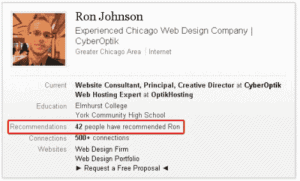
LinkedIn Recommendations can help your LinkedIn profile stand out from the crowd. LinkedIn Recommendations are testimonials from other LinkedIn users that give credibility to your skills and experience. Reputation is critical on LinkedIn, and by establishing a solid base of recommendations it can lend a lot of weight to your credibility. Whether you are a job seeker or a business seeking new clients, recommendations are one of the best ways to win over a prospect.
Why You Need Recommendations
In some cases, LinkedIn recommendations are taken with a grain of salt, since many LinkedIn users will swap recommendations even though they don’t have real experience working together. While this might be the case, prospects are also smart enough to read between the lines. A solid recommendation from a shared connection can make or break a deal.
Some major employers look for a minimum of ten positive recommendations before even considering an applicant. It’s part of the vetting process that can preclude you from even being considered.
Self promotion is not looked upon favorably on LinkedIn, or many other professional avenues. Saying that you are great at something is no replacement for having a credible professional attest to your skills and expertise. If there are enough credible people vouching for your skills, it goes a long way to showing prospects that you are worth their time.
Recommendations not only validate your skills, but they brand your name within your domain of expertise. Many jobs are given based solely on recommendations.
How to Get Recommendations
If you simply wait around for recommendations you will probably be waiting for a long time. It’s essential to put yourself out there and ask for them. Did you just finish a job and you know the client is happy with your work? Don’t be afraid to ask for a positive review.
However, don’t ask for recommendations from people you haven’t actually worked with or who can’t vouch for you. While you might get some recommendations this way, they will lack in credibility and can even hurt you if a prospect does their due diligence and communicates with the individual who recommended you. When they find out they have no real experience working with you, it can serve to invalidate all the other recommendations that you really did earn.
A Personal Touch
Whenever possible, try to ask for a recommendation in person, or by phone. Email can be suitable for the right type of relationship, but simply shooting out a bunch of emails might result in not only a low response rate, but also damaging the possibility of ever getting a recommendation from that individual.
The best time to ask for that recommendation is when you have just completed work for somebody. As soon as the job is done and it is fresh in their minds, reach out and ask for a recommendation. They are more apt to take the time to leave a recommendation when they just finished a job with you, and before they get distracted by the next project.
Recommendations should usually be short and to the point. You don’t need a four-page letter about every detail of the job you did, just a short note that summarizes what you did, why they are happy and why they would recommend you.
You can even present a short sample recommendation or some guidelines about what to expect. Sometimes this is easier for people to sign off on than taking the time to write something up from scratch, but don’t go overboard and make it ridiculous.
Real Recommendations Have Real Value
It’s important to stress how valuable real recommendations are. Go for quality, not quantity. Only seek out recommendations when the credit is due. False recommendations, or recommendations solicited from people you barely know doesn’t lend any credit to your name. In the long run, it can damage your image when people actually follow up with a reference and find that your recommendation is unfounded.



